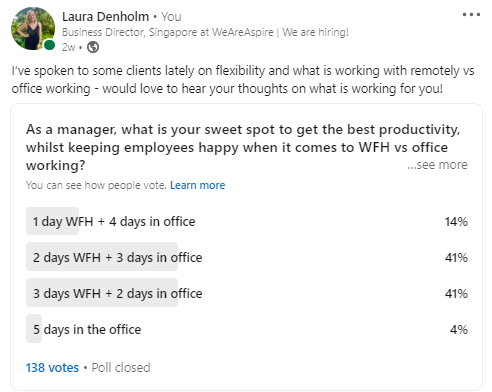
I recently conducted a poll on LinkedIn where I asked my network to share their thoughts on the ideal balance between working from home (WFH) and office-based work. The results shed light on the evolving preferences of employees when it comes to their work arrangements. While the survey represents a small sample, the insights are intriguing and provide valuable considerations for both employers and employees. While it’s clear to see that both junior and senior employees are very interested in working from home, let’s look into finding the most efficient balance.
Five days in the office is a throwback
The global pandemic brought numerous challenges, but it also prompted a re-evaluation of traditional work practices. The survey results strongly suggest that the majority of respondents are veering away from the idea of a full five-day work-week in the office. This shift can be attributed to the realization, during the challenging period of COVID-19, that remote work can be productive and beneficial.
The appeal of Work-from-Home:
One of the key takeaways from the survey is the equal preference for two days of work from home (WFH) and three days in the office, as well as three days WFH and two days in the office. They both scored the same. Several factors contribute to the appeal of remote work, including reduced commuting time and the freedom to work in a comfortable space. The ability to focus without interruptions and the flexibility to manage personal obligations are additional benefits reported by remote workers. However, it is essential to recognize that face-to-face collaboration remains crucial for many roles and employees who value the social aspect of office environments.

Finding the sweet spot for productivity
As the survey results indicate that the most popular options among respondents were two or three days of remote work per week, it suggests a desire for a hybrid work model that combines the best of both worlds. For some, coming into the office instills a sense of team cohesion and provides an environment conducive to productivity. Emphasizing this need for balance, the survey reveals the importance of fostering collaboration and maintaining a positive work environment.
Flexibility is key for candidates
Drawing on conversations with candidates and clients, it becomes apparent that flexibility remains a critical aspect for both job seekers and existing employees. In the past six months, only a handful of companies have insisted on a five-day office workweek. This insight underscores the importance of embracing hybrid work structures to attract and retain talent. Companies that offer flexible work arrangements are more likely to be viewed favorably by potential candidates and may experience higher levels of employee satisfaction and engagement.
What we do at Aspire
In our own office, we have successfully implemented fixed workdays to strike a balance between WFH and office work. The team comes into the office for three days of the week and works remotely for the remaining two days. This arrangement has proven beneficial, providing a structured start to the week while allowing for focused work and the advantages of remote work. Notably, we have observed an improvement in productivity since adopting this hybrid work model.
Advice for Employers and Job Seekers
As the landscape of work continues to evolve, employers must address the question of hybrid working during the hiring process. Potential talent may be hesitant to join organizations that do not have a flexible work structure in place. Therefore, companies should be prepared to offer hybrid work options or risk losing out on top talent. However, it is worth noting that employees who have a strong affinity for a company and role may be willing to embrace a traditional five-day office workweek if other factors align.
The LinkedIn poll on WFH vs office working preferences provides valuable insights into the evolving desires of employees. While remote work has gained popularity, it is clear that many individuals still appreciate the benefits of working in an office environment. Striking the right balance between the two is essential to optimize productivity.
If you're keen to catch up with me and discuss how other employers in your industry are managing working policies,please get in touch.
-
![Women in Leadership: Andrea Robinson]()
Leadership
Women in Leadership: Andrea Robinson
-
![Episode 4: How to hire for behaviours]()
Client
Episode 4: How to hire for behaviours
-
![International Recruiters Day: How did you get into recruitment?]()
Recruitment
International Recruiters Day: How did you get into recruitment?
-
![What’s important to the Events sector right now?]()
Candidate
What’s important to the Events sector right now?
-
![Episode 2: Where to start]()
Client
Episode 2: Where to start
-
![9 Compelling reasons to consider a career in Events]()
Candidate
9 Compelling reasons to consider a career in Events
-
![You can’t choose who to include in inclusion!]()
Hiring
You can’t choose who to include in inclusion!
-
![Employee Retention - what are you doing to conquer it]()
Employer
Employee Retention - what are you doing to conquer it







.jpg)